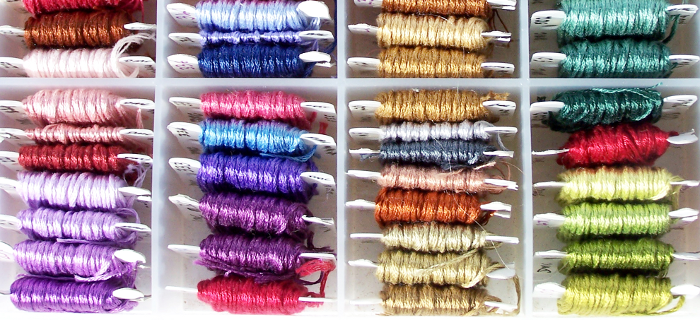Organizing Crafts

One of the biggest organizing challenges is craft items. If you're like me, you have way too many projects going at once: Projects your purchased years ago for "some day," and projects you continue to purchase on top of all your UFOs (UnFinished Objects). Many of you have more than one type of hobby and that doubles or triples your UFO load. Hopefully the following tips will help you cope with too much to do, too little time to do it.
Take a good hard look at your hobbies
Determine which projects you will really make time for. It was horrifying to me how much money I wasted over the years on "some day" projects.
I donated all my "won't do's" to a local shelter and nursing home. Somebody will get use out of these projects, just not me.
A place for everything
Have a specific storage system or area for each hobby. For example, crochet hooks/knitting needles fit great in a clear shoebox, labeled of course. Yarn fits in a hanging shoe organizer when you are not using it. I only work on one crochet project at a time and this is stored in a large basket by the couch. I work on crochet in the winter because it feels pretty good to have it covering my lap.
Cross-stitch paraphernalia is stored under the bed in 2 containers. One is for projects; the other contains hoops, frames, needles, floss and so on. When I purchase supplies for a project (as opposed to a kit), I put all of it, including the pattern, into a large zipper bag and throw it into the project box.
The good thing about under the bed boxes is that they only hold so much and you can't buy anything else until it fits (meaning you have to finish something). Did I mention this also takes great will power?
Scrapbooking has a 5-drawer unit in my closet. Paper/cardstock is in one drawer, scissors and personal trimmer, pens, rubber stamps, die cuts and stickers in the others. Your supplies can then be chosen and loaded into a portable container when you are headed to a crop.
TIME!
Now that you've gotten your hobbies grouped together, how do you find time to work on all of it? I use two different methods.
The first one is the UFO rotation that I got from a cross-stitch newsgroup on the Internet. The first step is to go through all your projects and pick five. These can be from any hobby type (scrapbooking is different). Make up a simple chart that lists the projects on the left side of the paper, leave room for additions as you finish your various projects.
Next, draw a chart next to the projects that has ten columns. Each square represents 10 hours. Start with Project 1. When you have completed 10 hours, make an X in the first column and pick up Project 2. Complete 10 hours, mark it off in the second row, first column, and move to Project 3. Repeat until you have put 10 hours in on all five projects. Go back to Project 1 and repeat. After you have finished the second 10 hours on Project 5, add Project 6, do 10 hours and go back to Project 1. This keeps you from getting bored and motivates you because you only have to work 10 hours on something before moving on.
This method generally works well with most types of hobbies. I do not use it for scrapbooking, though. I prefer to use my local scrapbook store's mega-crops for that. Twice a month, my local store holds 6-hour crops. I just take 10-20 pictures and work on those pages for 2-3 hours.
This may be difficult for those of you who have children, but consider it your time. If you look at all the things you do for your family--4 hours a month is nothing.
Cut yourself some slack
It doesn't happen overnight! Organizing your hobbies doesn't happen quickly and it shouldn't. You need time to decide which projects are important to you and which you can live without. You need to stick with it until the organizing is finished.
It may seem overwhelming at first, but take it one step at a time. It will be worth it because when it is finished, you will actually have time to enjoy your hobbies and isn't that why you took them up in the first place?
Kelli Heflin is a professional corporate environmental/safety trainer by education, reformed packrat by trade, who has discovered the joys of living clutter free. She became a professional organizer when she recognized that there were a lot of other people in the same situation who needed ways to free up time to enjoy the really important things in life.
